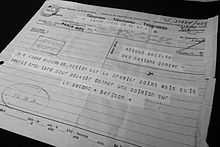International Committee on Intellectual Cooperation
| International Committee on Intellectual Cooperation | |||||
| International organization | |||||
| |||||
| Capital | Geneva | ||||
| Political structure | International organization | ||||
| Historical era | Interwar period | ||||
| - | Creation | 1922 | |||
| - | Dissolution | 1946 | |||


The International Committee on Intellectual Cooperation (sometimes League of Nations Committee on Intellectual Cooperation) was an advisory organization for the League of Nations which aimed to promote international cultural/intellectual exchange between scientists, researchers, teachers, artists and other intellectuals.[3] It was established in 1922, and counted such distinguished members as Henri Bergson, Albert Einstein, Marie Curie or Robert A. Millikan and famous experts as Béla Bartók, Thomas Mann, Salvador de Madariaga, and Paul Valéry.[4]
The plenary Committee (Geneva)
The International Committee on Intellectual Cooperation was formally established in January 1922 and was composed by 12 to 19 personalities. The first session was held in August 1922, under the chairmanship of Henri Bergson; it work continued until 1939. This committee, composed of leading figures such as Albert Einstein, Marie Curie, Kristine Bonnevie, Jules Destrée, Robert Andrews Millikan, Alfredo Rocco, Paul Painlevé, Gonzague de Reynold and Devendra N. Bannerjea was successively chaired by:
-
 France - Henri Bergson (1922-1925)
France - Henri Bergson (1922-1925) -
 Netherlands - Hendrik Lorentz (1925-1928)
Netherlands - Hendrik Lorentz (1925-1928) -
 Great Britain - Gilbert Murray (1928-1939).
Great Britain - Gilbert Murray (1928-1939).
Among the dozens experts consulted by the affiliated thematic committees, there is Béla Bartók, Thomas Mann, Salvador de Madariaga, or Paul Valéry.
The International Institute of Intellectual Cooperation (Paris)
In order to support the work of the commission in Geneva, the organization was offered assistance from France to establish an executive branch (the International Institute of Intellectual Cooperation) in Paris in 1926.[4] The Institute is statutorily directed by a French member, but it is placed under the authority of the plenary committee.
Directors:
-
 France - Julien Luchaire (1926-1930),
France - Julien Luchaire (1926-1930), -
 France - Henri Bonnet (1931-1940)
France - Henri Bonnet (1931-1940) -
 France - Jean-Jacques Mayoux (1945-1946).
France - Jean-Jacques Mayoux (1945-1946).
The ICIC worked closely with the International Educational Cinematographic Institute (Istituto Internazionale del Cinema Educatore) created in Rome in 1928 by the Italian government. Its work continued until 1946, when its role was taken over by UNESCO.
References
- ↑ LoN archives 1924, United Nations Offices in Geneva. Picture from this collection.
- ↑ Grandjean, Martin (2014). "La connaissance est un réseau". Les Cahiers du Numérique 10 (3): 37–54.
- ↑ Iriye, Akira (2002). Global Community: The Role of International Organizations in the Making of the Contemporary World. Berkeley: University of California Press. ISBN 0520231279.
- ↑ 4.0 4.1 Intellectual Cooperation and International Bureaux Section, United Nations Office in Geneva
External links
- Jean-Jacques Renoliet (1999), « L’UNESCO oubliée : l'Organisation de Coopération Intellectuelle (1921-1946) » (French)
- Martin Grandjean (2014), « Intellectual Cooperation: multi-level network analysis of an international organization »